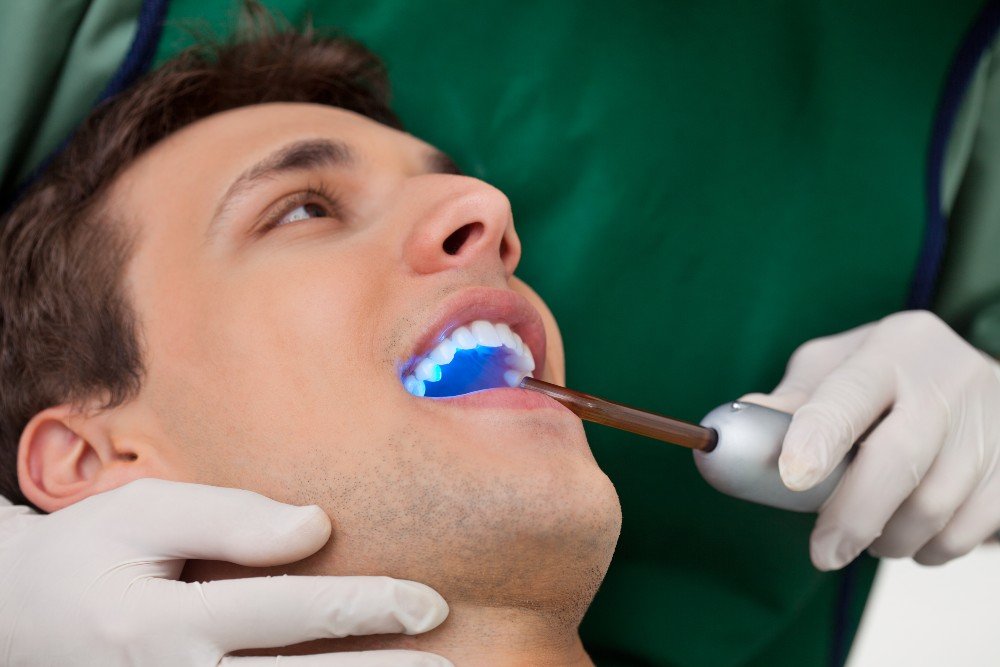Dental Teeth Bonding Treatment
What is Dental Bonding?
Do you have a chipped, discoloured or slightly misaligned tooth that’s shaking your confidence? You can fix it quickly with dental bonding, a popular cosmetic dental solution used to fix minor imperfections, favoured for its fast results and effectiveness.
Dental bonding is when the tooth-coloured resin is applied over your affected tooth, which is then moulded and smoothed to match your neighbouring teeth. This plastic material is “bonded” to your tooth and helps conceal any discolouration, fill minor gaps and correct slight misalignment while brightening your smile.
Dental bonding makes use of highly adhesive materials that are strong enough to stick to any material (from your outer enamel to metal, porcelain or ceramic used in other dental restorations) within a single application. This tooth-bonding resin is great for restoring decayed teeth and addressing any cosmetic improvements you want.

Fix minor issues with dental bonding
Why Do I Need Bonding?
Dental bonding is one of the easiest cosmetic dental procedures that can transform your smile. The treatment is typically painless and can be completed in just one visit, leaving you with a radiant smile you can’t wait to show off! What Can Teeth Bonding Fix?
- Chipped teeth – Restoring the appearance and function of teeth with minor chips or cracks
- Slightly shorter teeth – Lengthening shorter teeth, improving their appearance and restoring a proportionate smile.
- Slightly misaligned teeth – Reshaping uneven or misaligned teeth, creating a more symmetrical smile
- Minor gaps between teeth – Closing minor gaps or spaces between teeth
- Discoloured teeth – Masking stubborn stains or discolourations, leaving you with a brighter smile.
Bear in mind that dental bonding can’t be used in more severe cases for the above dental issues. In such instances, a more comprehensive treatment plan is needed to prevent health concerns from emerging. For example, if you have significant decay, severely overlapping teeth or extreme crowding, dental bonding would not be suitable for you.
Looking to find the best solution for your teeth? Book a consultation at Wyndham Dental for a comprehensive analysis.
What is the Treatment Process?
This process can last from thirty minutes to a full hour to complete, depending on how many teeth need to be done and the dental issues being concealed.
- During your initial consultation, we will do a thorough evaluation to determine your eligibility and how to create your ideal smile.
- The right shade of material will then be chosen to blend in with the natural colour of your teeth.
- The resin will be applied, moulded and smoothed into the appropriate shape over your affected tooth. A blue UV light will be used on the resin to harden it. Once hardened, your dentist will carry out a final polish and trim to make sure the finer details are achieved.
- Enjoy your new smile!
Dental Bonding vs. Porcelain Veneers
While both treatments are used to address aesthetic concerns, there are a few differences between the two. Dental bonding is a minimally invasive procedure that uses tooth-coloured composite resin, whereas porcelain veneers are customised restorations made from a durable ceramic substance.
While veneers can address a greater range of aesthetic concerns and are highly durable, they require a small amount of enamel to be removed before being placed on the surface of your tooth. Given its longer lifespan, veneers are more expensive.
The choice between dental bonding and veneers depends on your specific dental needs and goals. Consulting with one of our qualified Werribee dentists will help determine the most suitable treatment for achieving your desired smile transformation.
What is the Cost of Dental Bonding in Werribee?
Depending on various factors, including your oral health, whether any prior treatments are needed and the number of teeth that require bonding, the cost of dental bonding can vary. If you are considering dental bonding, get an accurate estimate by visiting one of our experienced Werribee dentists. Call us now to make an appointment.

How do I look after Dental Bonding?
Certain substances add superficial stains to your teeth (like tea, coffee, tobacco smoke, etc.), so we recommend avoiding these for the first 48 hours following your procedure to make sure your time and money aren’t wasted. Avoid chewing on hard objects (like ice or even your fingernails) as you don’t want your bonded teeth to chip.
Stick to your routine checkup every 6 months with our dental professionals so we can intercept any dental problems in their earliest stages. If you feel like your bite feels off or something is wrong with your dental bonding, call us ASAP so one of our dental professionals can assess the situation. Our dentists at Wyndham Dental have years of experience when it comes to restoring confidence in your smile so if you need any more details, feel free to give us a call!
FAQS
Yes! You can eat and drink as you normally would but try to avoid consuming hard food and biting on hard objects.
No. You can look after your teeth after dental bonding the same way you do your natural teeth. Brush daily, floss your teeth, and schedule regular dental checkups with your dentist.
Yes. There are alternative treatments such as dental veneers, crowns or orthodontic solutions for more complex issues. Our dentist can help you decide which option is best for your situation when you come for a visit.
Dental bonding typically lasts 4 to 8 years, with longevity influenced by oral care habits such as daily brushing and flossing.
The process of dental bonding usually requires 30 to 60 minutes per tooth for completion.
